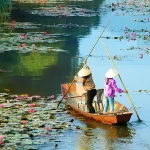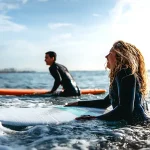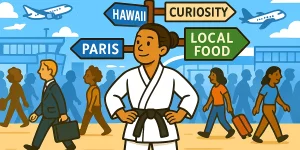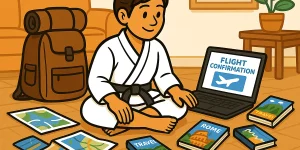Travel Better, Feel Better
Sustainable travel is the Black Belt of our Trip Kwon Do Travel Academy — the highest level and the most important step on the path to becoming a true traveler.
At this stage, we go beyond cheap flights and smart packing. We begin to travel with purpose — supporting local communities, protecting nature, and helping preserve the culture that makes each place unique. When approached with care, sustainable travel becomes more than a personal escape. It becomes a force for good.
This guide offers clear, practical tips that help you build those habits — not by being perfect, but by being more aware. A few thoughtful decisions, some curiosity, and a bit of local awareness can go a long way.
Let’s get into it.
Table of Contents
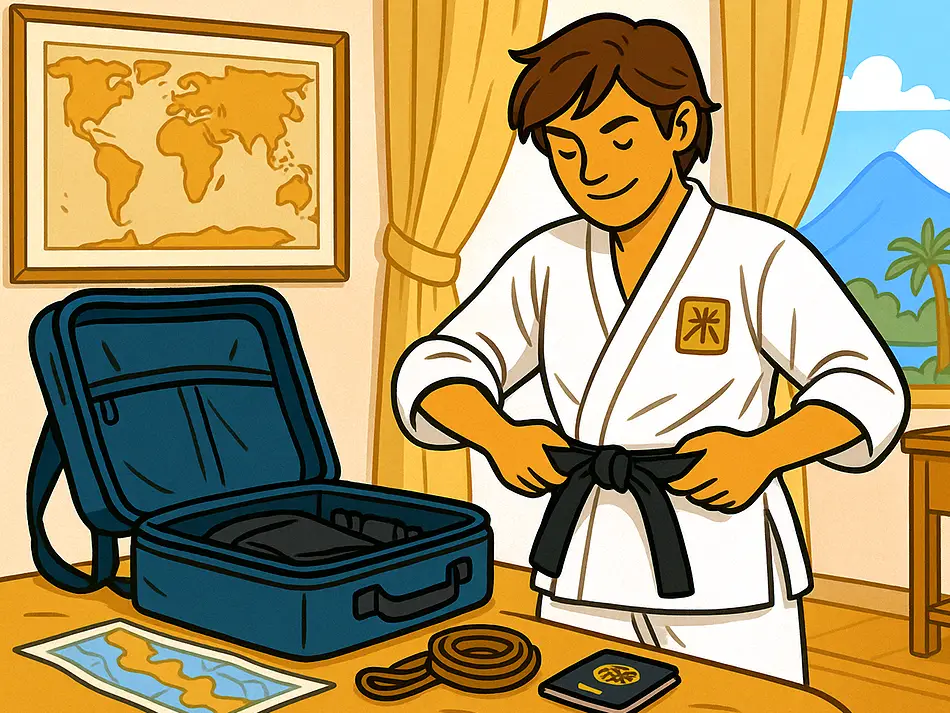
Before You Go: Easy Wins That Set the Tone
Responsible tourism doesn’t begin when you land — it begins before you leave. The way you plan your trip, book your flights, and pack your bag shapes the kind of impact you’ll have once you’re on the road.
A few early decisions can set you up to travel in a way that’s both practical and more respectful to the places you’re visiting.
Pack a few things that make low-waste travel easier
You don’t need a full kit of eco gear — just a few basics. Start with minimalist packing strategies that help you travel lighter and waste less.
What to bring:
- A reusable water bottle — ideally with a filter
- A foldable tote bag — for snacks, groceries, or takeout
- Quick-dry microfiber towel — сuts down on hotel laundry and packs small
- Eco-friendly sunscreen — reef-safe and better for marine life.
Leave the throwaway stuff behind. Skip anything that’s designed for one-time use or won’t survive the trip. Trip-Kwon-Do masters don’t travel with packaged wet wipes, single-use razors, flimsy rain ponchos, or cheap flip-flops that fall apart after two days. That’s not gear — that’s clutter. It’s waste you don’t need — and it often ends up in the wrong place.
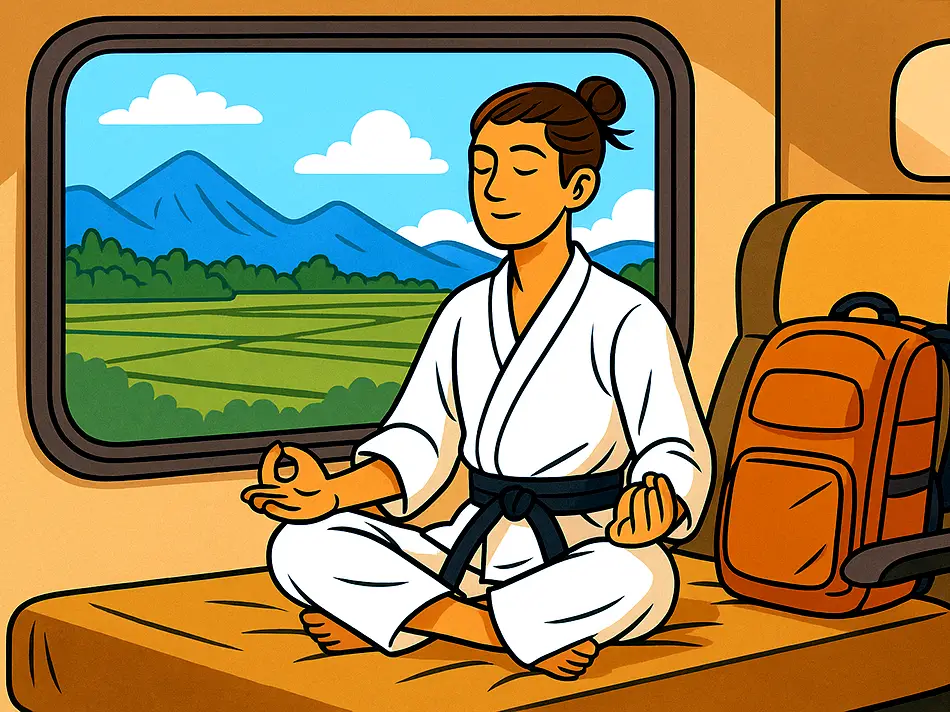
Rethink How You Move: Smarter Transport Choices
Transportation has the biggest environmental impact in most travel plans — but that doesn’t mean you need to give it all up. It just means you can be more thoughtful about how you move around, especially once you’re at your destination.
Consider alternatives to short-haul flights
In many regions, it’s easy to travel overland thanks to well-connected train and bus networks — and sometimes it’s faster than you’d think. Trains and long-distance buses are not only better for the environment, they also give you a different kind of travel experience. You don’t just pass through — you see things.
On the ground, choose transport that connects you
Cities aren’t built to be seen from the back seat of a car. You’ll find more memorable moments walking to a local market or hopping a rickety tram than sitting in traffic.
- Walk, cycle, or rent a scooter for short distances
- Take local buses or subways — cheap, efficient, authentic
If you’re renting, go small and smart
Some trips do require wheels — like rural areas or road trips. But there’s no need to overdo it. A smaller, more fuel-efficient car gets the job done without the environmental bloat.
- Look for hybrid or electric models when possible
- Skip the SUV unless you’re truly off-roading
Instead of rushing through five cities in five days, think about staying put longer and exploring deeper. You’ll create better memories and reduce your footprint without even trying.
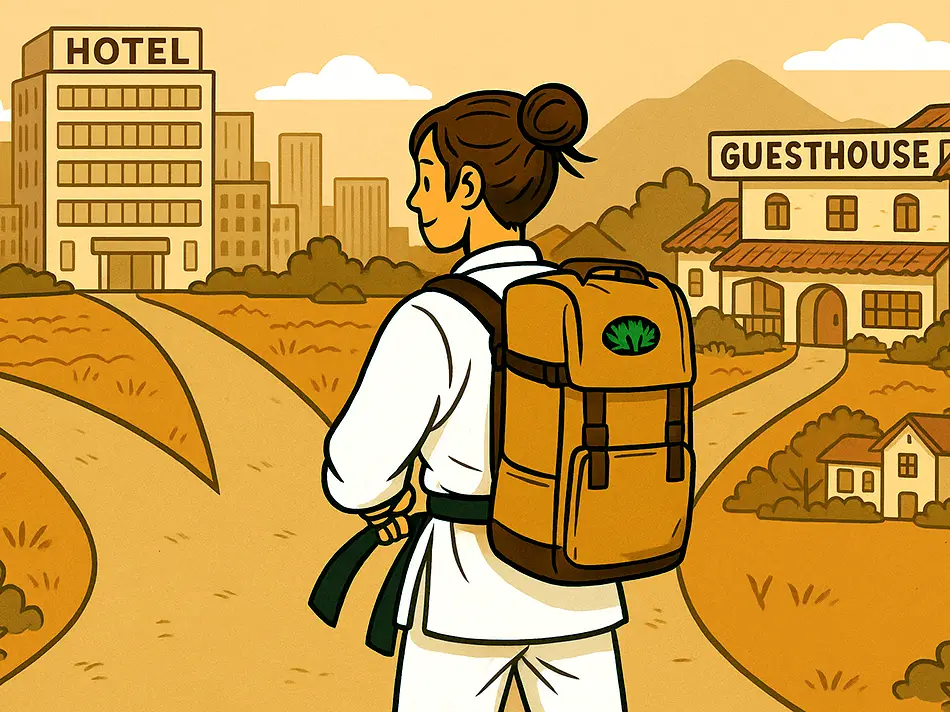
Where You Stay Matters: Choosing Accommodation That Does Some Good
Where you sleep doesn’t just affect your comfort — it affects the local economy, energy use, and even the culture around tourism. That doesn’t mean you need to sleep in a tent or sacrifice convenience. It means thinking a little more about who benefits from your booking — and how the place you stay fits into the destination.
Look beyond the big booking platforms
It’s tempting to let an algorithm decide for you, but mass-market booking sites often favor chains and high-volume properties. Those aren’t always the worst, but they’re not always the best either — especially when it comes to sustainability.
Try going a bit deeper:
- Check if the accommodation is locally owned or run by a family rather than a corporate brand
- Look at guest reviews for mentions of sustainable practices or local partnerships
Large resorts tend to consume more resources — more electricity, more water, more waste. A smaller guesthouse or boutique hotel is not only more energy-efficient — it also fits well with smart budget travel tactics. Plus, it often puts you closer to real neighborhoods, not just the tourist bubble.
Booking your stays in advance can definitely make your trip run more smoothly — especially during high season — but staying flexible has its perks. Some of the most authentic, memorable places aren’t listed on booking apps or even Google Maps.
Asking around or walking into small guesthouses on the road can lead you to hidden gems that offer a richer connection to local life — far beyond the comfort zone of typical tourist picks.
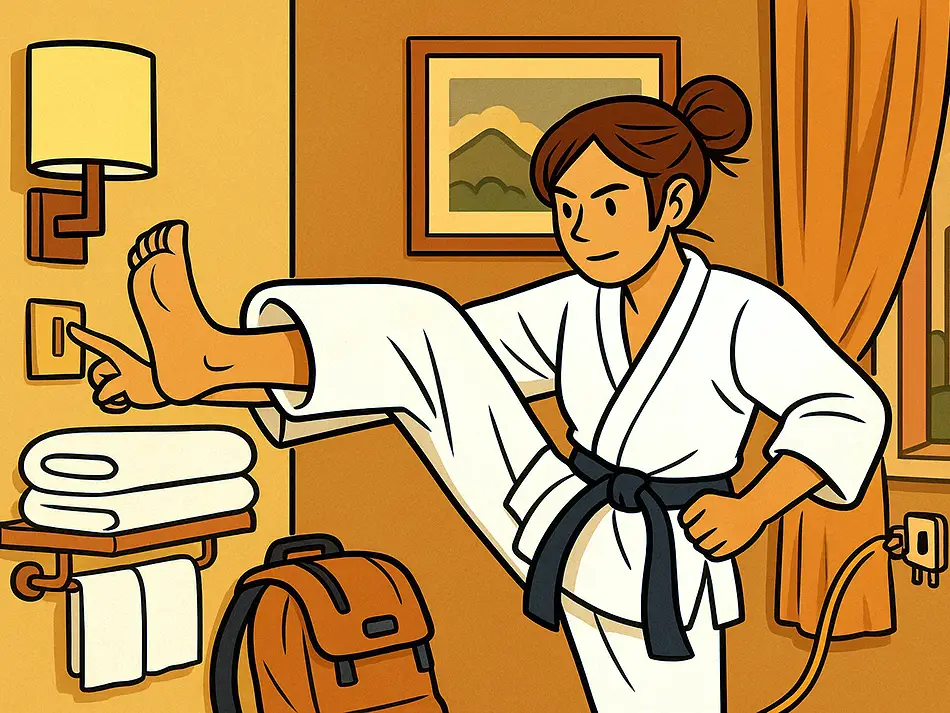
Be a low-impact guest
Even the best hotel can’t do much if every guest demands fresh towels twice a day and leaves the AC running with the windows open.
A few small habits that actually help:
- Skip daily towel or sheet changes unless you truly need them
- Turn off lights, air conditioning, and chargers when you leave the room
- Avoid using all the single-use extras — tiny water bottles, individually wrapped soaps, and disposable toothpaste kits are still waste, even if they’re free
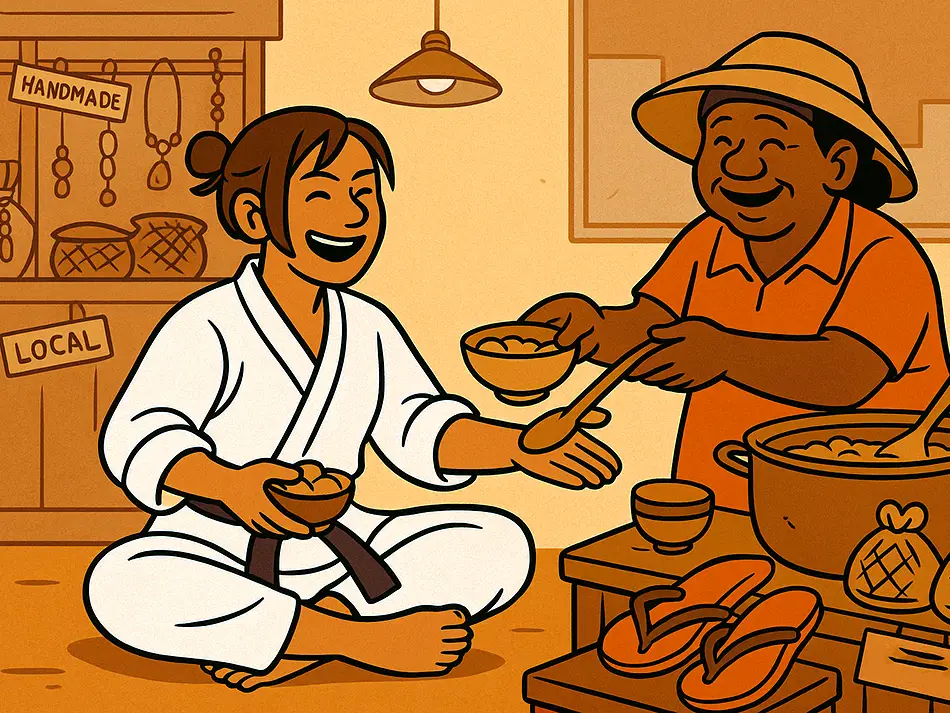
Eat & Shop Sustainably: Taste the Culture Without Trashing It
Food and souvenirs are two of the most memorable parts of any trip — and also two of the easiest areas to make more responsible travel choices. The goal isn’t to eat vegan or never buy anything. It’s to be more aware of where your money’s going, what impact it has, and whether it supports the place you’re visiting.
Eat what’s local — and try not to waste
Imported, packaged foods often come with a high carbon footprint and little connection to the destination. Local meals, on the other hand, usually support small producers and reflect seasonal availability. And they taste better.
That doesn’t mean you have to eat whatever’s on offer just to prove a point. But saying yes to a market snack or a home-cooked dish instead of defaulting to fast food? That’s a win for everyone.
Simple choices:
- Choose restaurants that use local produce
- Avoid excessive food waste — order what you’ll actually finish
Skip the plastic-wrapped souvenirs
Not all souvenirs are created equal. The key is to support real craftspeople — not factories or resellers shipping mass-produced junk across borders.
Look for:
- Handmade items (textiles, ceramics, local artwork)
- Regional specialties that reflect local identity
And if you’re not sure? Ask the seller about the item’s origin. A vendor who knows the story is more likely to be selling something authentic.
Watch for what not to buy. Even if it looks cool, some items come with hidden costs — for ecosystems, for animals, or for the communities involved in their production.
Avoid:
- Souvenirs made from coral, shells, ivory, or exotic woods
- Anything made from endangered animals or ancient artifacts
A good rule of thumb: if you wouldn’t be comfortable explaining how it was made, skip it.
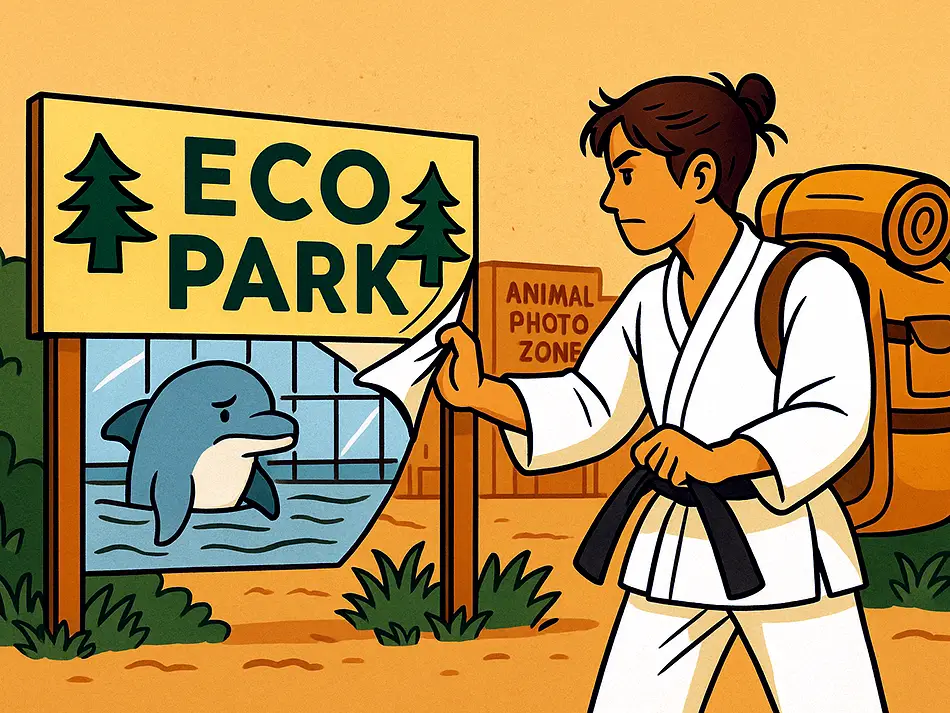
Not All Eco Is Ethical: How to Spot the Greenwashing
Eco this, sustainable that — tourism is full of buzzwords. But just because something uses the word green doesn’t mean it’s doing anything good. In fact, some of the most damaging activities are the ones wrapped in the thickest layer of “eco-friendly” branding.
This section is about cutting through that noise and helping you make better choices — not perfect ones, just more honest ones.
If there’s a wild animal involved, think twice
Plenty of places sell themselves as sanctuaries, but still offer elephant rides, tiger selfies, or dolphin shows. A real sanctuary doesn’t let you touch the animals, ride them, or watch them perform tricks.
If the animals are performing for you, being touched by tourists, or live in small enclosures — it’s not ethical, no matter what the brochure says.
Red flags:
- Elephant rides or bathing sessions marketed as “interaction”
- Tiger selfies, snake handling, or photos with sedated animals
- Dolphinariums, contact zoos, or wildlife that seems unusually tame
Experiences should benefit locals — not just entertain tourists
Some “cultural tours” reduce real communities to costumes and performances. If a visit to a village feels more like a photo op than an exchange, you’re probably not seeing the real thing — and the community may not be benefiting at all.
Better options:
- Tours run by locals, not just about them
- Experiences with limited group sizes, fair pricing, and no pressure to buy
Ask simple questions before booking anything
You don’t need a PhD in ethics to figure out if something’s off. Just ask a few basic things — and pay attention to how the answers are delivered.
Good signs:
- Transparency about where your money goes
- Clear limits on group size or interaction with wildlife
- Staff or guides who are local and knowledgeable, not just salesy
If you’re met with vague answers, high-pressure tactics, or the sense that this is all just for show — trust your gut. You’re probably right.

Respect the Place: Nature, People, Culture
Sustainability isn’t just about the environment. It’s about how you move through a place — how you treat people, how you show up, and how much care you give to things that aren’t yours. The more respect you bring with you, the more meaningful your trip becomes.
Nature isn’t a backdrop — it’s a living thing
That cliff, that forest, that coral reef — none of it was built for your Instagram post. And it can be damaged faster than most people realize. Walking off trail, touching coral, carving your name into a tree — it all leaves a mark.
A few rules that should be obvious (but often aren’t):
- Stay on marked trails and respect park rules
- Don’t take “souvenirs” like shells, sand, or stones
- Keep a respectful distance from wildlife — no feeding, no chasing
People aren’t part of the attraction
It’s easy to slip into “observer” mode when traveling — especially in places that feel unfamiliar. But real people live here, and you’re a guest. The best thing you can do is act like one.
That means:
- Learning a few polite phrases in the local language
- Asking before taking someone’s photo
- Dressing appropriately for the culture and context
You don’t have to blend in completely, but showing that you’ve made an effort goes a long way. Most people respond to respect with warmth — and that’s when the best travel stories begin.
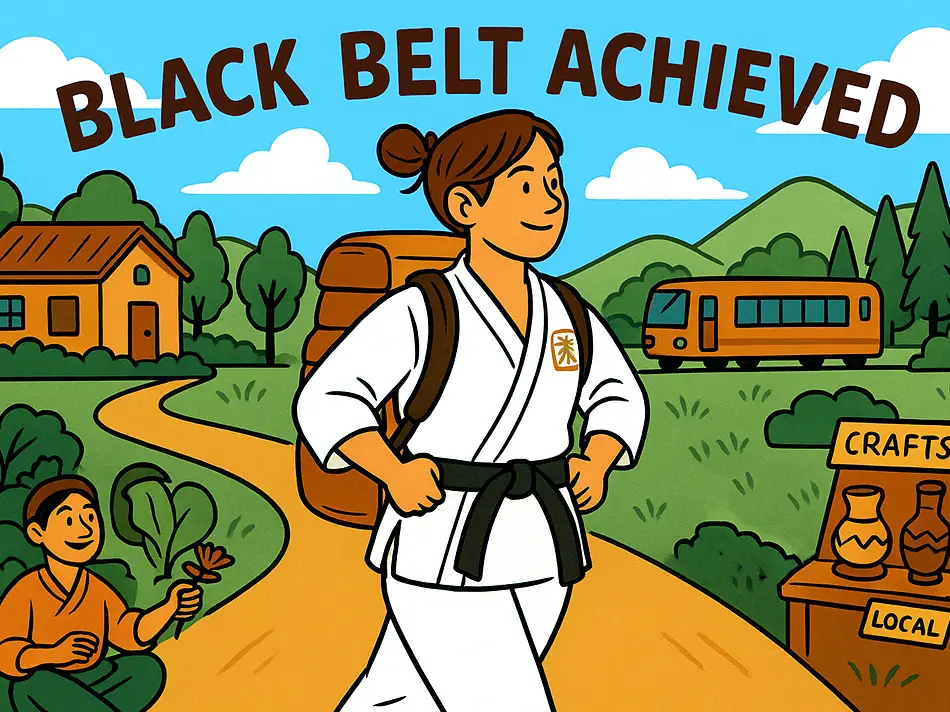
Every Choice Counts
Sustainable travel isn’t about being perfect. It’s not about checking a box or following a trend. It’s about being aware — of your choices, your impact, and the places you’re lucky enough to visit.
You don’t need to overhaul your entire travel style to start making a difference. Choosing a local guesthouse over a chain hotel helps. Walking instead of calling a ride makes a difference. Asking a few more questions before booking that elephant tour? That’s progress too.
None of these things are huge on their own. But taken together — multiplied across thousands of travelers — they matter.
Make small choices that add up — they matter more than you think. Stay curious. Ask questions. And remember: travel is about connection. With people, with places, and with the world itself.
If you’ve made it this far — and you’re ready to put it into practice — congratulations. You’ve just reached the Black Belt level in our Trip Kwon Do Travel Academy. This is the highest step on your journey to becoming a true traveler. Keep traveling with intention, and lead by example wherever you go.

